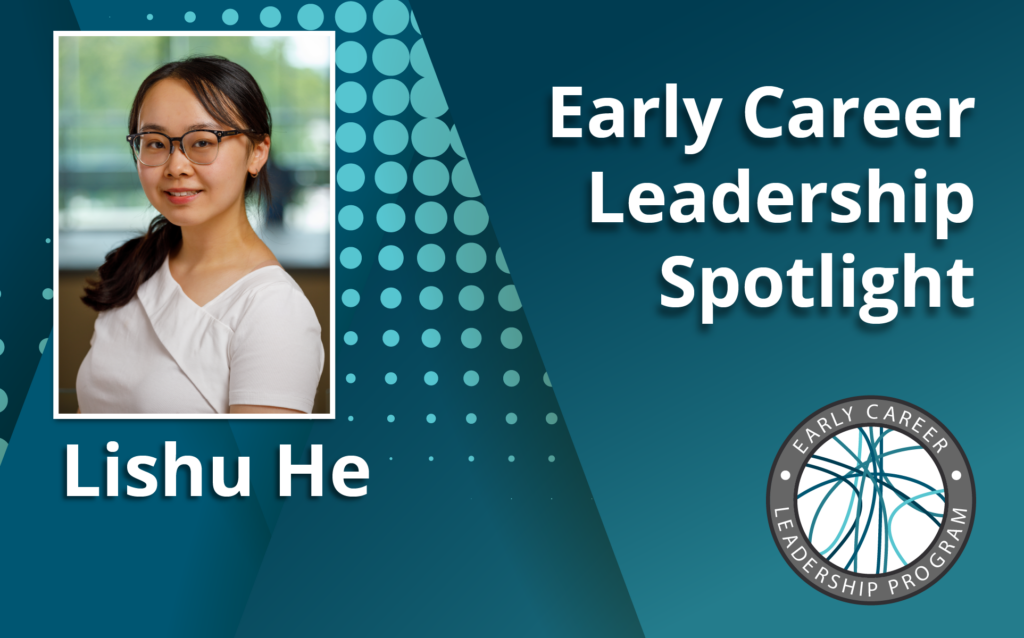We’re taking time to get to know the members of the GSA’s Early Career Scientist Committees. Join us to learn more about our early career scientist advocates.
Lishu He
Community and Membership Engagement Subcommittee
Medical College of Wisconsin
Research Interest:
I grew up in a nuclear household of medical workers, so I developed an interest in biology and medicine very early on. Throughout my schooling back home in China, I did not have opportunities to explore biomedical research in detail, but with my parents’ support, I left my high school early to pursue college education in the United States. In college, I was able to indulge my curiosity and expand my interests in science. In the summer of my sophomore year, I had the opportunity to do an internship in the laboratory of Dr. Mingyu Liang, where I studied cardiac fibrosis. This experience opened my eyes to what a rewarding career research could be and how a tiny molecule like microRNA can drastically impact kidney diseases. My experience that summer prompted me to pursue graduate study at the Medical College of Wisconsin, where I was fortunate to meet many remarkable individuals, cherished friends, and lifelong mentors. There I also reconnected with Dr. Liang, whose lab I eventually joined. Now, I’m studying the transcriptional regulatory landscape of cell-specific response to hypertension and have the privilege of leveraging cutting-edge techniques every day to answer clinically relevant scientific questions. As kidney research moves towards a precision medicine-based, personalized direction, my long-term research goal is to contribute to research that improves kidney disease outcomes and prevents kidney disease progression by leveraging clinical evidence as well as multi-omics technologies (e.g., epigenomics, transcriptomics).
As a PhD-trained scientist, you have many career options. What interests you the most?
If I were asked this question at the beginning of my PhD studies, my initial answer would have been that I want to be a Principal Investigator leading my own research group. My studies and graduate school experience so far have impacted my perspectives, interests, and priorities. I realized I enjoyed doing hands-on research, communicating across disciplines, and reading about science, but less so writing grants and navigating the tenure world. I also developed a strong interest in translational research—how we can “translate” findings in basic science into tangible benefits for patients. For me, translational research also has a layer of “translating” those complex discoveries for the general public so they can be more informed about the treatments they are receiving and any potential impact on their health. Although I am still not quite sure where exactly I will go, I know I would like to keep working in a research- and science-focused setting at the nexus of basic science research, clinical application, and therapeutic development. There, I can communicate science to a wide variety of audiences, continue learning, facilitate research applications at the bedside, and contribute to the development of more efficacious therapeutics.
In addition to your research, how do you want to advance the scientific enterprise?
The scientific enterprise is so much more than science alone. In my five years in graduate school thus far, I have witnessed a glaring disparity in educational resources disproportionally affecting students of color and lower socioeconomic statuses. These students are also at higher risk of mental health struggles because they have to face additional barriers on top of the already-mounting stress of studies. At the Medical College of Wisconsin, I joined a group of students to advocate for a more equitable, transparent institutional infrastructure that would help this population, typically struggling to access higher education and support, pursue their career or academic aspirations. We started pipeline initiatives to directly place woman-identifying students in research internships with women faculty in science to foster mentorship and support. We jump-started housing resources and collaborations with the local Milwaukee community members to help incoming graduate students who may be struggling with housing locate affordable options. We compiled and publicized admission, mental health, and success metrics on students of color and school policy on equity and inclusion to push for the institution’s accountability for recruiting more diverse student cohorts. We also started peer support groups amongst the graduate students to build a support network for everyone. I hope to continue contributing to a more equitable environment where scientists from diverse backgrounds can feel welcomed and supported, lift each other up, and advocate for each other.
As a leader within the Genetics Society of America, what do you hope to accomplish?
I joined ECLP hoping to branch out beyond my institution. I’ve always enjoyed connecting with fellow scientists-in-training and researchers from other fields and backgrounds. Joining GSA and ECLP has been a wonderful opportunity for me to network with more early career scientists. It also puts into perspective the challenges and concerns we ought to address in our subcommittee programming. I hope to help organize and compile more networking opportunities, mentorship support and advocacy, professional development resources, and expert workshops for early career scientists in the broader GSA communities and beyond.
Previous Leadership Experience:
2022–ongoing: Social Media Coordinator, A Safe Haven for Asians and Asian Americans (ASHAAA)
2021–ongoing: Communications Chair, Interdisciplinary Doctoral Program (IDP) International Students Committee, Medical College of Wisconsin
2019–2020: Representative, IDP, Title IX committee and Community Outreach committee, Graduate Student Association, Medical College of Wisconsin
2019–2020: Chair, IDP Mentorship program, Medical College of Wisconsin
2018: Vice President of Service, Alpha Phi Omega – National Service Fraternity, Phi Chapter, Syracuse University




